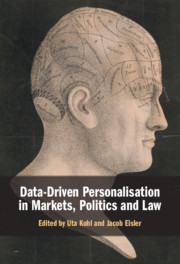Book contents
- Data-Driven Personalisation in Markets, Politics and Law
- Data-Driven Personalisation in Markets, Politics and Law
- Copyright page
- Contents
- Figures
- Tables
- Contributors
- Preface
- Part I Introduction: Theoretical Perspectives
- 1 The Pixelated Person: Humanity in the Grip of Algorithmic Personalisation
- 2 Personalisation and Digital Modernity: Deconstructing the Myths of the Subjunctive World
- 3 Personalisation, Power and the Datafied Subject
- 4 Personal Data and Collective Value: Data-Driven Personalisation as Network Effect
- Part II Themes: Personal Autonomy, Market Choices and the Presumption of Innocence
- Part III Applications: From Personalised Medicine and Pricing to Political Micro-Targeting
- Part IV The Future of Personalisation: Algorithmic Foretelling and Its Limits
- Index
3 - Personalisation, Power and the Datafied Subject
from Part I - Introduction: Theoretical Perspectives
Published online by Cambridge University Press: 09 July 2021
- Data-Driven Personalisation in Markets, Politics and Law
- Data-Driven Personalisation in Markets, Politics and Law
- Copyright page
- Contents
- Figures
- Tables
- Contributors
- Preface
- Part I Introduction: Theoretical Perspectives
- 1 The Pixelated Person: Humanity in the Grip of Algorithmic Personalisation
- 2 Personalisation and Digital Modernity: Deconstructing the Myths of the Subjunctive World
- 3 Personalisation, Power and the Datafied Subject
- 4 Personal Data and Collective Value: Data-Driven Personalisation as Network Effect
- Part II Themes: Personal Autonomy, Market Choices and the Presumption of Innocence
- Part III Applications: From Personalised Medicine and Pricing to Political Micro-Targeting
- Part IV The Future of Personalisation: Algorithmic Foretelling and Its Limits
- Index
Summary
Drawing upon Foucauldian ideas this chapter explores how the ‘datafication’ of modern life shifts the modes of power acting upon the individual and social body. Through a brief exploration of three banal everyday social practices (driving, health, gambling) it argues that the construction of the data-self marks an emergent algorithmic govermentality centred simultaneously upon intimate knowledge of the individual (subjectivities) and the population. The intersection of technology, data and subjectivation, reproduces a ‘neoliberal subject’ – one closely monitored and policed to freely perform ‘correct’ forms of action or behaviour, and one increasingly governed by the imperatives of private capital. This chapter explores how this nexus between power and knowledge is central to debates about the relocation (or appropriation) of personal and population data from state to non-state institutions, with private corporations increasingly managing the health and wellbeing of individuals and society. It makes an argument for critical engagement with the complex interactions, intersections, effects and unintended consequences of multiple technologies that, through the use of data, make the simultaneous government of individuals and populations their targets of action.
- Type
- Chapter
- Information
- Data-Driven Personalisation in Markets, Politics and Law , pp. 55 - 73Publisher: Cambridge University PressPrint publication year: 2021



